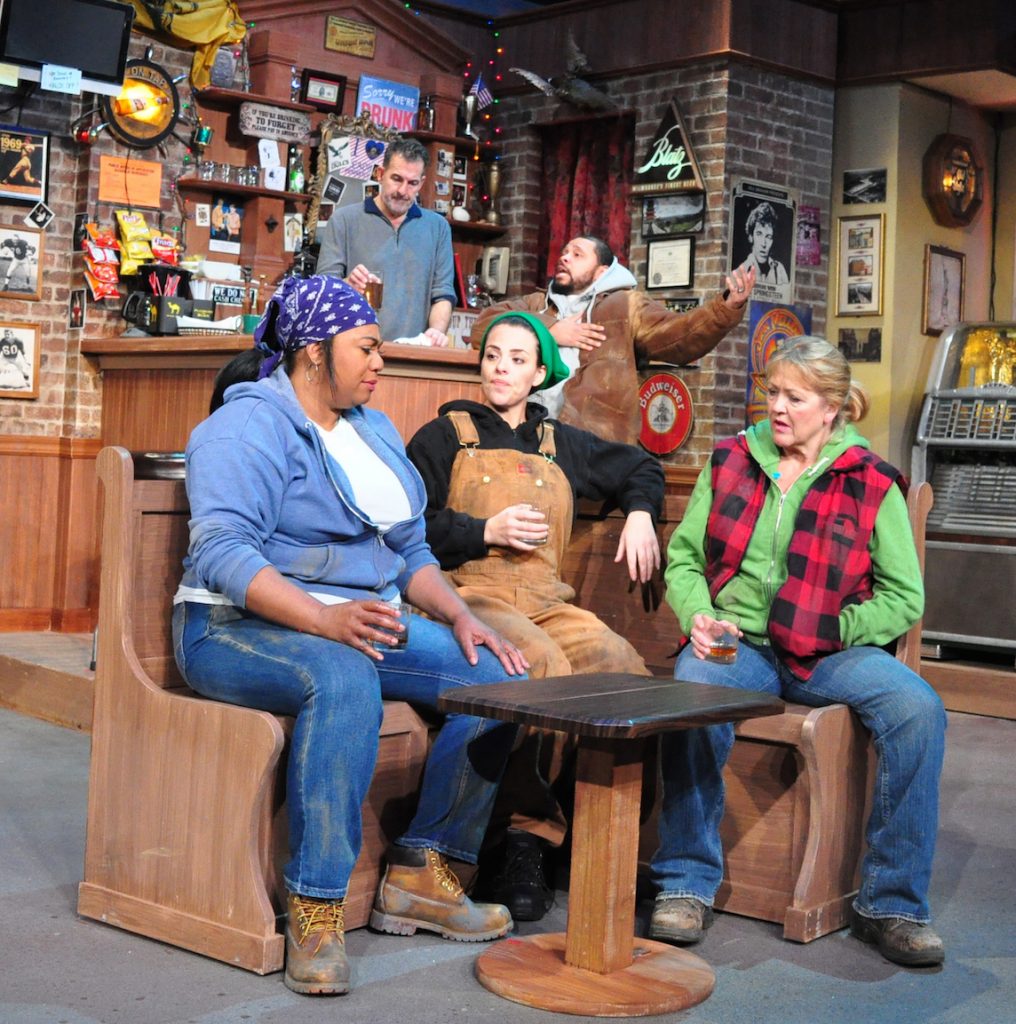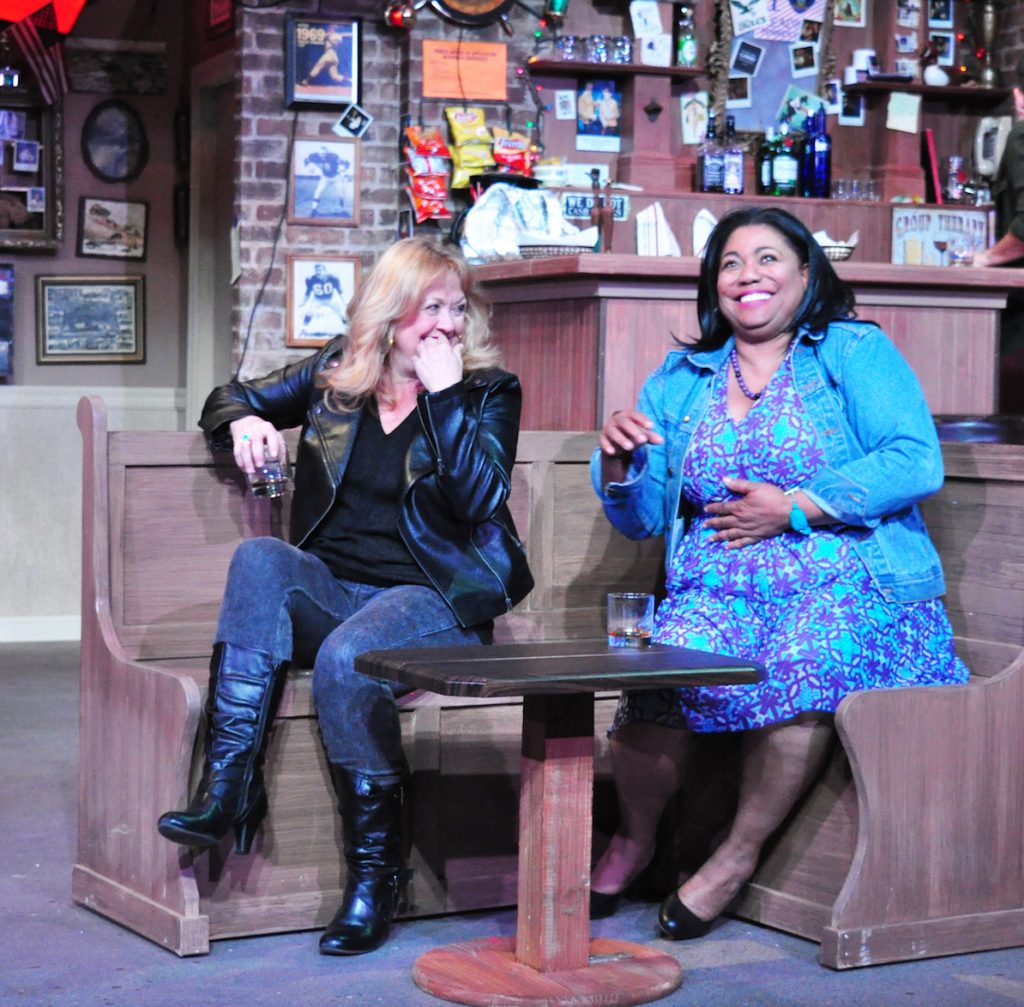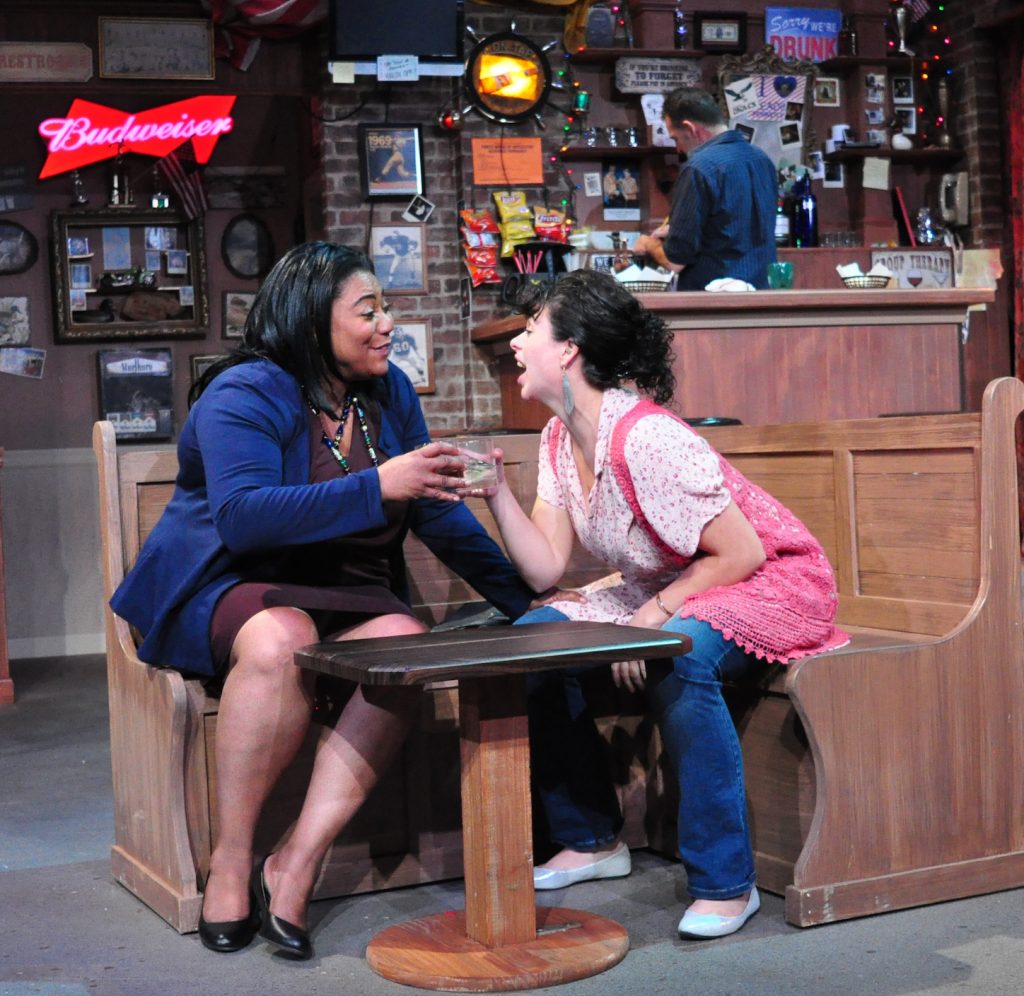Review presented by UMB Private Wealth Management
A drop of Sweat at the Unicorn Theatre

Tsk, tsk. Shame, shame. That’s the sentiment come to heart witnessing the deterioration of the economy and the American right to sweat blood. Such is the premise of Sweat at the Unicorn Theatre.
It’s the transition year into the new millennium and the effects of President Clinton’s NAFTA “jobs” bill are taking hold of the industrial town of Reading, PA. “The plant” is the centerpiece of economic upheaval and losses are not calculated just in dollars, but in trusted social connections.
A black woman, Cynthia (Cecilia Ananya), and her white colleague of over 20 years, Tracey (Jan Rogge), wiggle into their favorite bar, girl grinding to ’90s pop music and forcing those spirits high. They meet their BFF Jessie (Vanessa A. Davis) who’s using a bar table to keep her already-wasted-beyond-repair-self vertical. They join bartender Stan (Greg Butell) who serves up the drinks and the wisdom.
The ladies commune over war stories with lovers, some gossip over pervy bosses, and complaining over this NAFTA indecency.
Cynthia and Tracey have sons. Those sons are friends. Those sons put the story into context. Things are real. Things are bad. Punching in, punching out. Drinkin’ and druggin’. Bills, bills, bills. And most horrifying, developing the expectations that come with sacrificing our youth to the assembly line.
Rifts are torn into the fabric tying this social circle together. What happens when one of the girls gets promoted to management? What happens when she clears her drops of sweat from the machine floor and trades in for air-conditioning? What happens to routines and loyalties?
What happens when it doesn’t matter anymore because everyone’s livelihoods are disappearing —poof!—by job exportation?
Sweat, written by Brooklyn playwright turned Ivy League powerhouse Lynn Nottage, is an explosive tale about the economy as a powder keg. A bar is the perfect backdrop for illuminating the disgrace endured in transition. For every trouble, goes a drink. No one faces the truth. Emotions boil and then the whole damn thing blows up.
Post intermission, the energy detonates. The beginning is moderately heavy-hitting, but the conclusion takes full advantage of the volatility set up from the start.

The truest shame reflected in the story is how the worker wears emotional blinders. After generations of contributing labor to a company, the expectation is loyalty, fairness. When that loyalty and fairness do not come, the worker must reinvent herself. She must use her imagination, get creative, and aspire to something more. But, in Sweat she never does.
Scarcity, fear, a sense of entitlement drives each character. They visit this bar draped in American flags, the TV pulsing in on GW Bush, and not one of them heeds the warning that their way of life is coming to an end. It is a crying shame that they don’t prepare.
Each of them stands as a totem to some social stereotype. Cynthia is the black woman keeping her head down until she can get her shot. Oscar (Justin Barron) is the poor Latino kid being blamed for all of immigration. Chris (Teddy Trice) and Jason (Matthew J. Lindblom), with their PO Evan (Keenan Ramos) are the fallout of economic collapse.
Brucie (Lewis J. Morrow) skitters in as an omen. He is what has already become of the men who’ve lost their jobs to NAFTA. The spiraling into the chasm of defeat is expertly balanced with Morrow’s rough and tumble interpretation of a man and system that has outlived its usefulness, but still has hope in the future. Not for himself. For his son. Through his son, he can imagine the possibilities.

But Tracey, she is the one who is human. She is not simply the white woman who expects loyalty even through her blatant racism. She is the one with dimension. She has pain, prejudices, and misguided sentiments. With impeccable timing, Jan Rogge allows us to revel in Tracey’s flaws and the sincerity of her grief. It is this grief that robs her of the foresight to get off that line, strips her of the ability to strategize, and empties her of the real thing keeping her whole: friendship.
Even as the story allows us to question the individual’s relationship to the economy and her duty to the whole; allows us to recognize that workers blame each other, rather than corporate powers; allows us to remember that we must know when to pivot, Sweat is truly a question about what we deserve because we’ve worked hard.

At what point do expectations become entitlements?
The Unicorn Theatre addresses the will to survive with this play, but also economic hardship with their pay-what-you-can days. See Sweat now through November 11.
Directed by
Ian R. Crawford
Players
Jan Rogge, Cecilia Ananya, Vanessa A. Davis, Lewis J. Morrow, Teddy Trice, Matthew J. Lindblom, Greg Butell, and Keenan Ramos
Producing Artistic Director
Cynthia Levin


